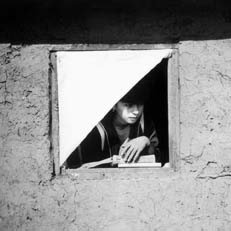|
Spring 1997 (5.1)
Photo: Elnur Babayev in an Azerbaijani Refugee Camp The U.S. government maintains that its post-Cold War foreign policy, and its use of foreign aid in particular, are now aimed in large part at promoting democracy overseas. Given a chance to back that rhetoric with action in one obvious case, the administration has flubbed it. The country in question is Armenia, a nation of fewer than 4 million in the rugged Caucasus mountains. Armenia regained its long-lost independence in 1991 with the breakup of the Soviet Union. Enjoying widespread support in Congress, it has been receiving more U.S. aid per capita than any nation except Israel. For a time, this generosity seemed well-placed, and not just because of the emotional ties between Armenia and America, a nation with a substantial community of ethnic Armenians. While a succession of coups and civil wars attended the births of neighboring former Soviet republics Azerbaijan and Georgia, Armenia got off to an auspicious political start, electing a president and parliament democratically. Landlocked and energy-poor, Armenia needed all the humanitarian aid it could get, and it seemed likely to use that aid well.
Things went wrong during the past two years, however, with President Levon Ter-Petrossian banning political parties, shutting newspapers and otherwise becoming more autocratic. This trend culminated in a September 22 presidential election, which only the reelected Mr. Ter-Petrossian and his entourage defended as fair. An Armenian election-monitoring team, composed of neutral nongovernmental organizations, reported "violations and irregularities in the voting process [and] serious abuses and breaches of the law during the vote count" which "raise a serious question as to the validity of the entire electoral process and the outcome of the presidential elections." Yet in the administration's 1998 budget proposal, Armenia takes only a small hit and emerges as once again the biggest per capita recipient in the former Soviet Union. Georgia, which has been making great progress on political and economic reform under President Eduard Shevardnadze, would get a lot more than last year, but still only about one-fourth of Armenia's total on a per-capita basis. It's hard to see the logic in this. No one argues that Armenia should be totally cut off (as has been Belarus, another Soviet republic gone autocratic-but one without a domestic U.S. constituency). By all means, provide some humanitarian aid; work with civic groups to foster a return to democracy; stay involved. But to continue giving so generously
is to say that all the U.S. lip service about democracy is only
that. If one country can derail its democracy but stay on track
for U.S. aid, why should any other country believe U.S. rhetoric? From Azerbaijan International (5.1) Spring 1997. Back to Index
AI 5.1 (Spring 1997) |


